Everyone Is Allowed to Dream | Cover Story | Salt Lake City
Utah @ 125
Part 1
The red rock, sage desert and rocky peak landscapes of Utah, to initial explorers and new arrivals, might may have seemed barren and foreboding. Dramatic, yes, but impenetrable.
So, too, can the culture of Utah seem daunting to outsiders, until they begin to venture along side streets and back roads. Off the beaten path, they discover the diversity that makes this state, and the people who live in it, unique beyond the stereotypes.
That dynamic culture is the centerpiece of this year’s celebration of the 125th anniversary of Utah’s statehood. Along with historical reflection, months of events for Thrive125 shine a spotlight on the artists, performers, and writers who call Utah home and the organizations that keep them employed.
More importantly, Thrive125 taps an array of voices to tell the story of Utah’s past, present and future—and to tell the story honestly.
Those sharing their perspective include those whose ancestors lived in this area long before white settlers as well as those who have only recently arrived. They include those who have found a personal paradise in Utah as well as those who have yet to fully realize the promise and potential of this state. They include Mormon and gentile voices, white, brown and Black voices, young and old voices.
To capture those views, Thrive125 asked 22 writers to provide their thoughts on Utah in 125 words. The resulting poems, essays and personal narratives are included in the Utah @ 125 digital chapbook and are republished here by City Weekly in this issue and the next—helping kick off National Poetry Month.
Contributors for this project range from Utah Poet Laureate Paisley Rekdal to Tayler Fang, a recent Logan High School graduate who served as 2019-2020’s National Student Poet of the West. Other writers include slam poets, playwrights, nature writers, activists and novelists who live throughout the state.
Reading these short-short writings opens a window into many corners of Utah’s cultural and physical landscapes and reinforces how much they are intertwined. Writers describe a Bonneville Trail hike on the winter solstice, the anchoring feeling of watching quails march across a front yard, extraordinary views from on top and inside the artworks of “Spiral Jetty” and “Sun Tunnels,” and what it means to grow up in a town like Beaver.
Ideally, everybody will find words that resonate with them in these writings.
Thrive125 is organized by the Utah Department of Heritage & Arts, which includes seven divisions working to make Utah a more livable and creative place.
Other Thrive125 events include a statewide book club and a historical exhibit at the Utah Capitol. More information can be found at thrive125.utah.gov.
—by Josh Loftin
Utah Department of Heritage & Arts

Paisley Rekdal: A Few Lines About Poetry
Utah’s poet laureate, Paisley Rekdal, founded the Mapping Literary Utah website. She has written nonfiction books and six volumes of poetry. City Weekly asked her a few questions about her love of verse.
How did you become the Utah poet laureate?
Paisley Rekdal: The poet laureate job is an honorary position that you’re invited to apply for. It’s mostly a community position, since the poet laureate is meant to make poetry more accessible to Utah’s residents. With that in mind, I’ve done a number of projects. The biggest is Mapping Literary Utah (mappingliteraryutah.org), a web archive I created of Utah writers and poets, past and present. There are poets, prose writers, playwrights, spoken word performers, cowboy poets, storytellers and Utah State Poetry Society members on the site.
The second big project is the Utah Poetry Festival, which (this year) is obviously virtual, plus a month-long (virtual) celebration of Utah poets and poetry via social media.
The third was a commissioned poem about the transcontinental railroad for the 150th anniversary of its completion in Promontory, Utah. The poem, “West: A Translation,” is a multi-media poem I’m currently turning into a website with poem-videos, and also a book. Beyond that, I’ve been doing a number of K-12 workshops and visits, along with workshops in the community and in the prisons.
Why is National Poetry Month celebrated for the month of April?
National Poetry Month is a whole month because of calendar bureaucrats. I have no idea why poetry gets all of April—”the cruelest month,” according to T.S. Eliot, which it certainly has become for poets’ schedules. But it’s also a time when people get to experience poetry, maybe for the first time all year, and for that I’m always happy.
The one event taking place in Utah that you can’t miss is the virtual Utah Poetry Festival on April 16-18, 2021, utahpoetryfestival.com). While we had to strip the in-person conference back to its barest bones due to the very real fact of Zoom fatigue, one thing I’m excited about is being able to showcase nearly 60 Utah residents and poets over the course of April.
Each day in April, at 8 a.m. and 6 p.m., the Utah Humanities Book Festival and I will be sharing a video of a Utah resident reading an original poem. You can find these videos on our Twitter, Instagram and Facebook pages, or by going to the Utah Humanities Book Festival YouTube channel.
Pointers on how best to appreciate poetry
Appreciating poetry requires that the reader spend time with language, reading carefully and without panic—something that’s sometimes hard for novice poetry readers to do. People tend to think that poems are elaborate riddles, but poems speak to us in the same words that appear in newspaper articles, in ads, in songs, in novels. These words may be put together in stranger and more exciting ways, but that’s the delight of poetry. If you have patience, curiosity and a dictionary, you can read any poem out there.
How do you start writing a poem?
You just start writing. There is, sadly, no magic to it at all, outside of the magical ability to forget your own self-consciousness for a moment.
Poets that inspire you?
This is far too long to answer here, so let me say that each book and project I work on creates its own specific list of muses. I’m currently inspired by the work of Brian Teare, Honorée Fanonne Jeffers and Susan Briante, among others.
Your thoughts on making a career as a poet?
I’m not sure being a poet has historically been much of a career, though more and younger poets are finding great success via social media, which allows them to attract larger audiences, as well as to sell and promote their work. But this is a tough market to crack—there are thousands of people doing exactly this, and maybe half a dozen poets become notable names. The reality is that poetry for the vast majority of people isn’t a career, it’s a vocation, and if you want to “make it” as a poet, you simply have to read, write and share poetry. Hopefully, you will publish books and give readings, and possibly write articles and teach. But relying on poetry itself to make you money is a tricky proposition.
—by Jerre Wroble
Swallow
By Paisley Rekdal
So ignorant of the world I think it’s pleasure first
that makes it dip hallucinatory arcs
across this foggy, close-cropped field
and not the insects wet legs kick up–
Here, and almost here, these
sharp darts that stop me in my tracks: poised, senseless
to its direction
skimming just below, the lingering white
only it sees through and negotiates where I
am less than a stone to it, less than a flea
in the dun belly flashing under the slick blue back–
Wings clip the brief air between us,
scythe the sweet middle of my life where sea mist
seeps its yellow curls, the step ahead and behind me blurred
to the same cold capacities.
Somewhere a twist of fence, a scar
of ragged earth a truck tore open in the grasses
to work itself free.
Dark shank of hair
gleaming in the wet, skin frozen to the bone,
a pair of deer feeding at the wild
last hedge of raspberries.
Paisley Rekdal, a University of Utah professor, is Utah’s poet laureate, founder of the Mapping Literary Utah website, author of six poetry collections, and guest editor for the Best American Poetry 2020 collection.
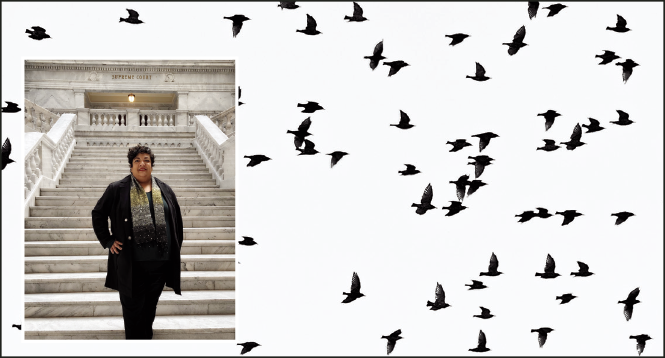
The Land of the Free
By Gloria Arredondo
The land of the free
radiates an infinite light.
Everyone is allowed to dream
and invited to extend their wings to fly.
There are those born in faraway lands.
Cruel fate plucked their wings.
Once at birth and again
crossing an imaginary line.
The starless people could only hope
for food, shelter and overtime.
They could not expect tax breaks,
health benefits nor stimulus checks.
Foreigners have children in Zion;
offspring never better seen than they are.
Some are kept in cages,
Others are sent to fight
for a county that demonizes them.
Starless people do not feel the butterflies
But, they’re using their ripped wings
to enhance those of their children.
Children born in ‘The Land of the Free.’
Gloria Arrendondo is a Mexican author and artist, woman’s rights advocate, social communicator and passionate poet for truth. She is a columnist for Utah’s La Bala magazine and New York’s Al Rojo News.
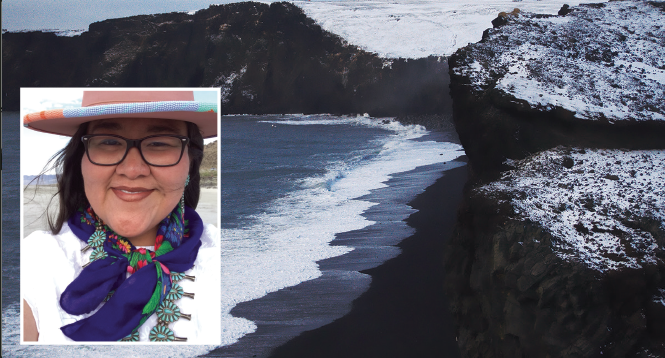
Failed Elegy for Dobby the House-Elf
By Tacey M. Atsitty
When I walk by the mirror/without really looking, I think I’m Rambo//not because he’s Navajo on his mother’s side/but the bounce & slight curl/of his hair, skin taut across his face/his solemnity, forbearing sheets/and sheets of rain still yet to cover us/at the cold, gray beachfront, where magic is supposed to happen, instead its where Dobby dies/when Dobby died, I meant to write/an elegy for him, about his innocence//he wasn’t just spliced like Ron//it’s just how it’s got to be/when things are going too well, and even/though you rub sand grains between/your toes, taste salt passing from wave/and wind to tongue, your skin rises in bumps/writing rows of affirmation: you’re really there/holding a dear friend in your arms/writing his death with every breath you take.
Tacey M. Atsitty earned bachelor’s degrees from Brigham Young University and the Institute of American Indian Arts, an MFA from Cornell University and is a Ph.D. student at Florida State University.
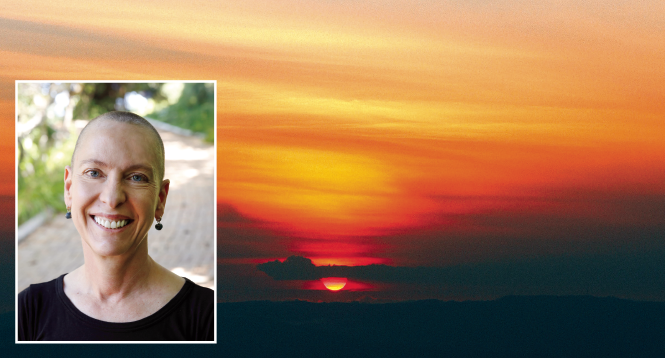
any of us could be swept out to sea,
By Katharine Coles
any of our hearts fly off or dissolve into blue. The given day’s mountains awash in clouds look like geology’s oldest idea, always arriving; so many lives could have been
others, full of sparrow calls, kisses, death or nights brimming with meaning—all only the usual kinds. Then, after decades, we find each other
shying away, keeping faces to ourselves; we wonder how history, after so long ticking past, at last accounted for something. Imagine a century accumulating like this
and then some. How we lose hours as often as mark them—but not this year, this hour. Once in a while we have to celebrate not how time holds
but the way it always goes.
Katharine Coles has published seven poetry collections, including 2019’s Wayward, and a memoir, 2018’s Look Both Ways, with two books forthcoming in 2021. She is an English professor at the University of Utah.

Los Hogares de Mi Lengua (The Homes of My Tongue)
By Chelsea Guevara
Spanish was always the cutest boy at the dance. And my tongue now sways with him under the roof of my mouth like she’d dreamt about for years.
I say Utah is home, but I bring him through the doors and so many say he is too loud above the beat; does not dance rigid, dance right. Like they do.
We nestle in the corners they don’t want to visit at the family parties. This is where I’ve found the truest definition of home. Where we host the family that wants to learn his footwork, and host the family who has known every step their whole life. Who’s known him longer than before I realized I couldn’t say I was home, without him here, too.
Chelsea Guevara is a West Jordan spoken-word poet and University of Utah student who is Caucasian and Salvadoran American. She finds joy in amplifying voices of marginalized people, especially in the Latinx community.
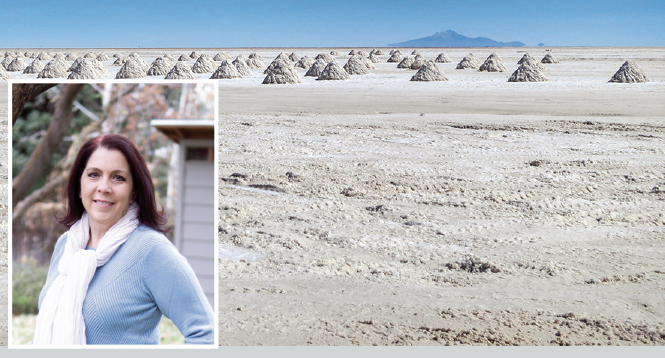
Gathering of the Salt
By Trish Hopkinson
Teetering on the shoulders of native lands, gazing into murky
remnants of Bonneville blue to the red cliffs and sloping pine
skirts of the horizon, progress seems distant, yet imminent, in
merciful inversion fissures projecting slices of radiance to valley
floors. Rising to touch the wingtips of mountain bluebirds, the
margins ascend layers of latter-day yard goods—knitted with
iron rods and strings from fallen angels, patriarchy, and stifling—
beginning to unravel and shred where hems trail one-hundred-
twenty-five years past. At the crease, an early equinox slowly
unfolds, welcomes all sides to receive the sun, shake off
noxiousness, exhale admissions, smash the champagne against
the repaired hull, give every voice a flute full, lick away the salt,
let loose the anchor ropes, prepare to embark.
Trish Hopkinson is a poet, blogger and advocate. She runs Rock Canyon Poets and folds poems for Provo Poetry’s Poemball machines. Hopkinson answers to labels such as atheist, feminist and empty nester. selfishpoet.com
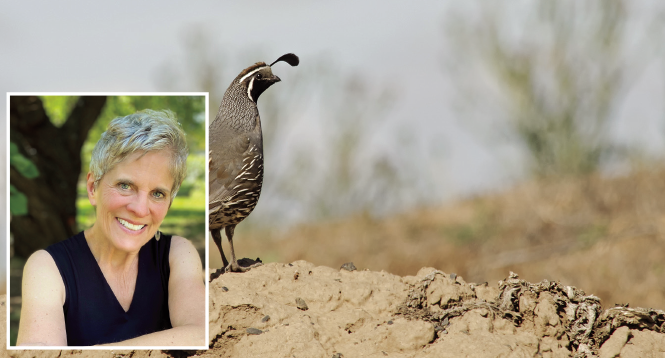
Convert
By Elaine Jarvik
We drove down Parley’s in the dark, eating the last of the cookies my mother had baked us 2,000 miles to the east. The canyon, the names, the number of stars—nothing was familiar. We took an exit called “State,” drove past a large bowling pin, found a cheap motel, climbed under thin sheets. In the morning, I stood in the parking lot and looked across the Salt Lake Valley, counting all the people and trees that were missing. But let this be a cautionary tale. There will be an impossible blueness to the sky. One day there will be baby quail dancing across your yard, and the comforting grid of numbered streets, and the sharp silhouette of the Oquirrhs in fading December light.
Elaine Jarvik is a veteran Salt Lake City journalist and playwright whose plays have been produced at the Plan B and Pygmalion theater companies and at the Salt Lake Acting Company.
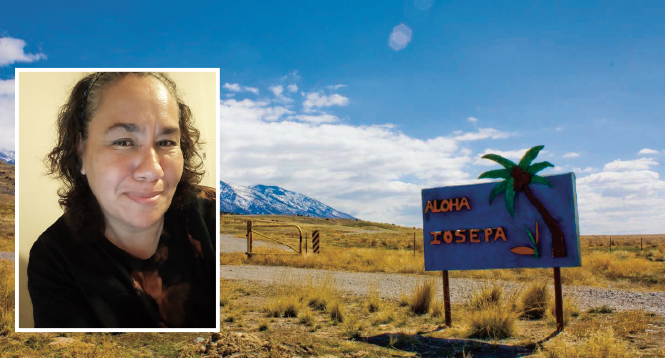
The Salty History of Utah
By Sia Figiel
To truly understand this place, you have to know the struggles of the saints. How they persevered and endured. Crossing treacherous terrain to reach God’s country, said Aunty E. After a prayer on Pioneer Day, a month after we, too, first arrived from American Samoa.
Football is
Going to love
These boys
Says Uncle M
He says it in Samoan.
With head bowing to
The Wassattsi Range.
Nephew J invites us to Pride
Parade: 100’s of
Men & women
Of all ages & sizes
& color in glitter
& rainbow banners
Behind Pacific Islanders
MORMON MOMS
4 = RIGHTS!
Upon our first sighting of Skull Valley
Once “the most progressive city in Utah”
We taste Ocean
Streaming down our faces
While the wind whimpers
A serendipitous embrace
Of aloha
Sia Figiel is a Samoan-American poet, translator, novelist and mother of two sons. She has written four novels, a collection of prose-poetry, and is working on her fifth novel, Humiliation.
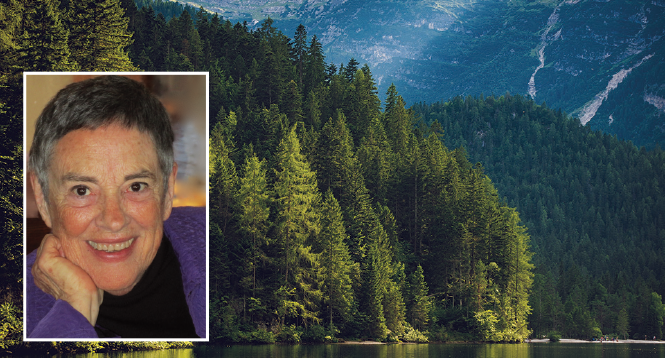
If You Grew Up in Beaver
By Julie Jensen
If you grow up in Beaver, Utah,
you know everything about everyone,
all two thousand people living there.
Who choked on a spoon,
who drove into the lake.
Who gave birth to a child,
who died in her sleep,
who got killed in a mine,
who threw scissors at her sister.
Who’s breaking up,
who’s beaten up.
Who left her husband,
who came back to his wife.
Who put her mother in the old folks’ home,
and who shot himself out by the chicken coop.
Then you move away.
There are far more people,
but you know next to nothing about any of them.
Those other places,
they can teach you how to write plays.
But Utah—
Utah teaches you what to write about.
Julie Jensen has written more than 30 plays, all professionally produced. She has taught playwriting at six universities and believes writing makes you strong and writing plays makes you understanding.
Part II of Utah @ 125 will be published on April 8.


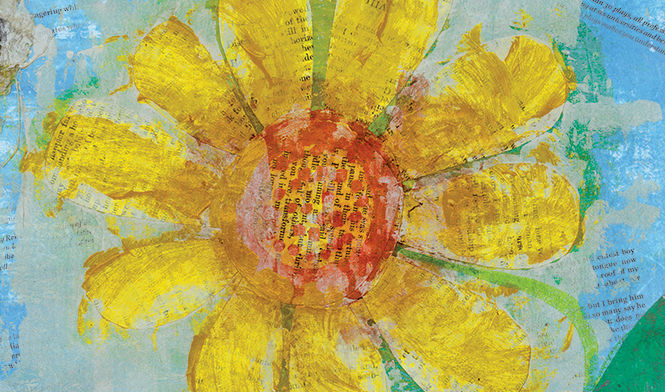
Comments are closed.